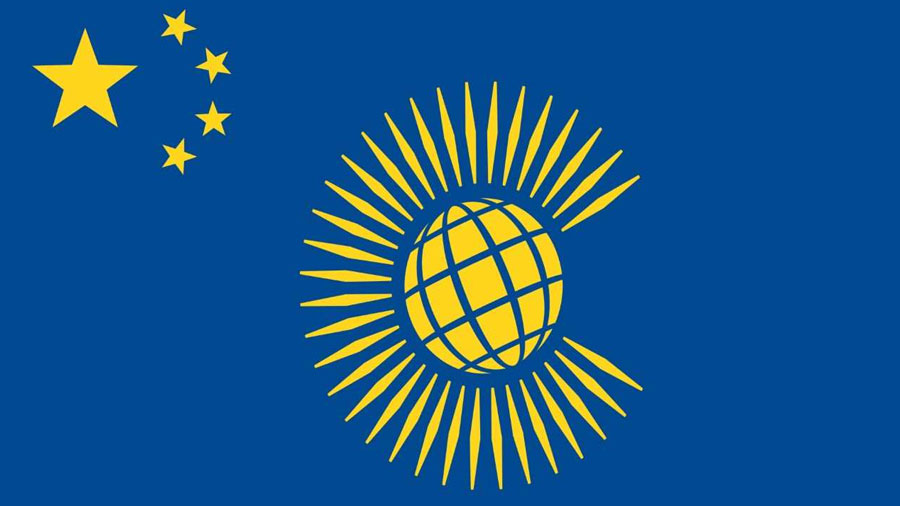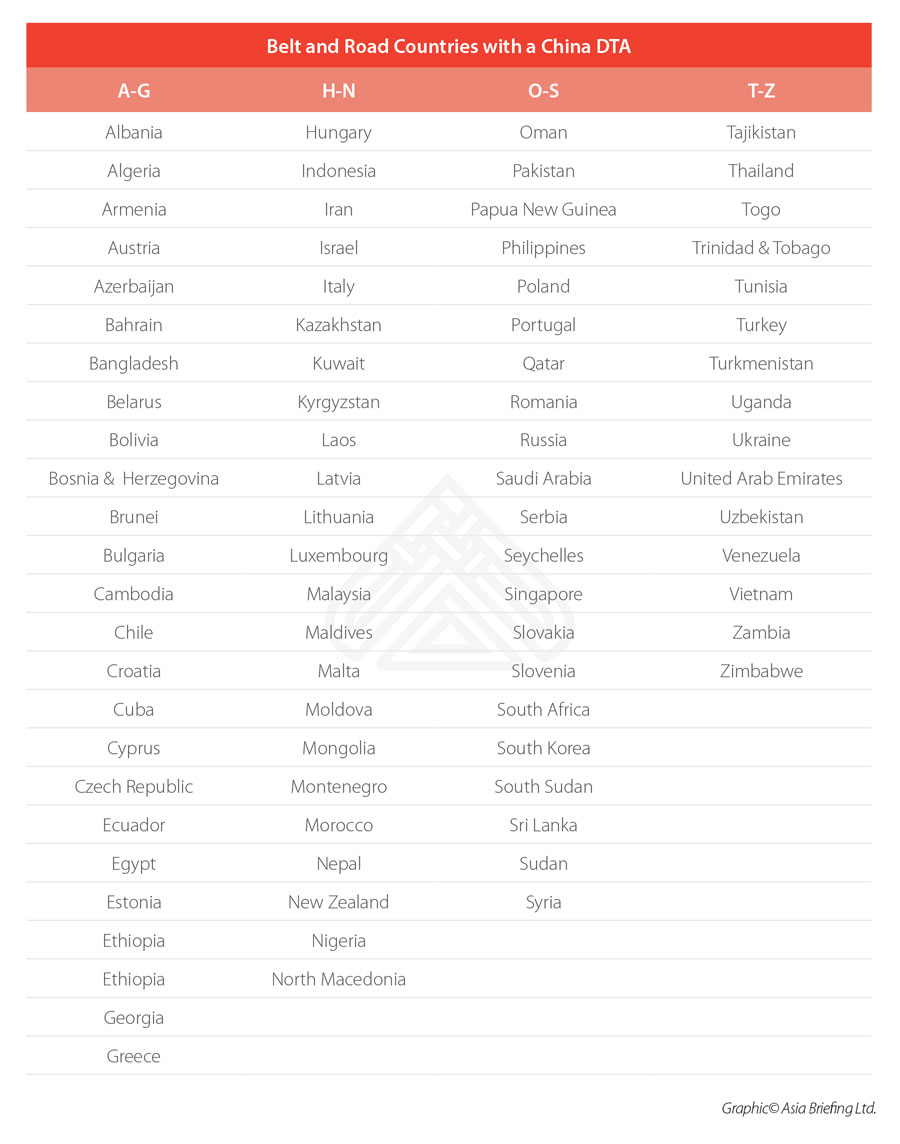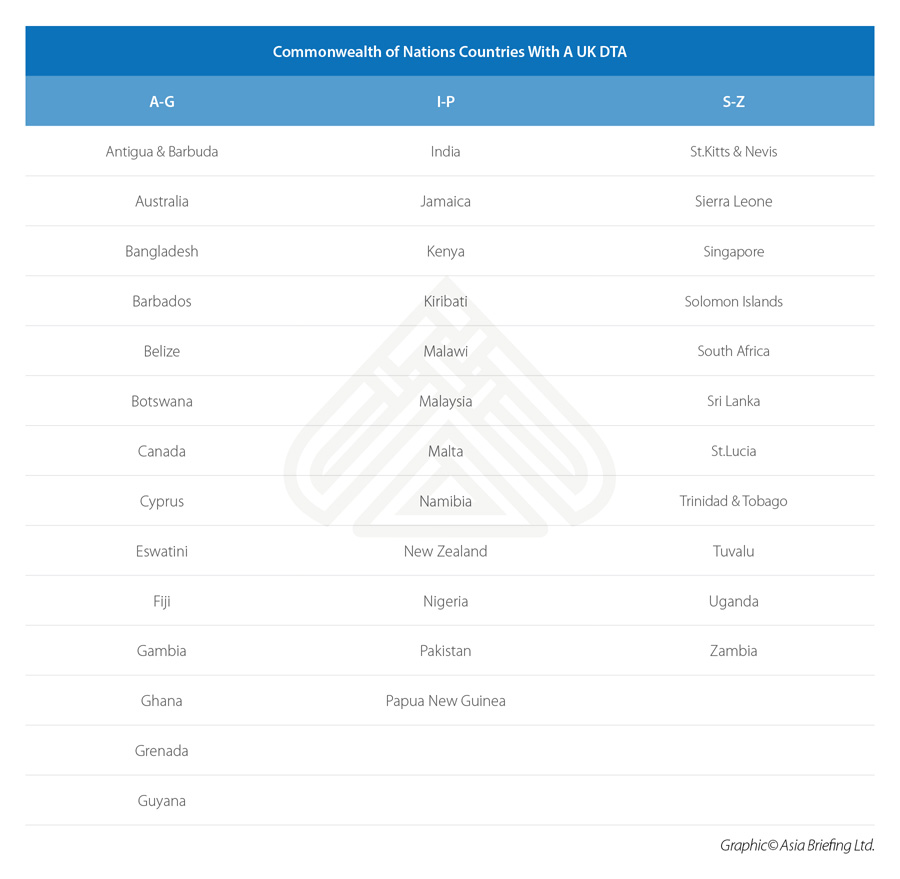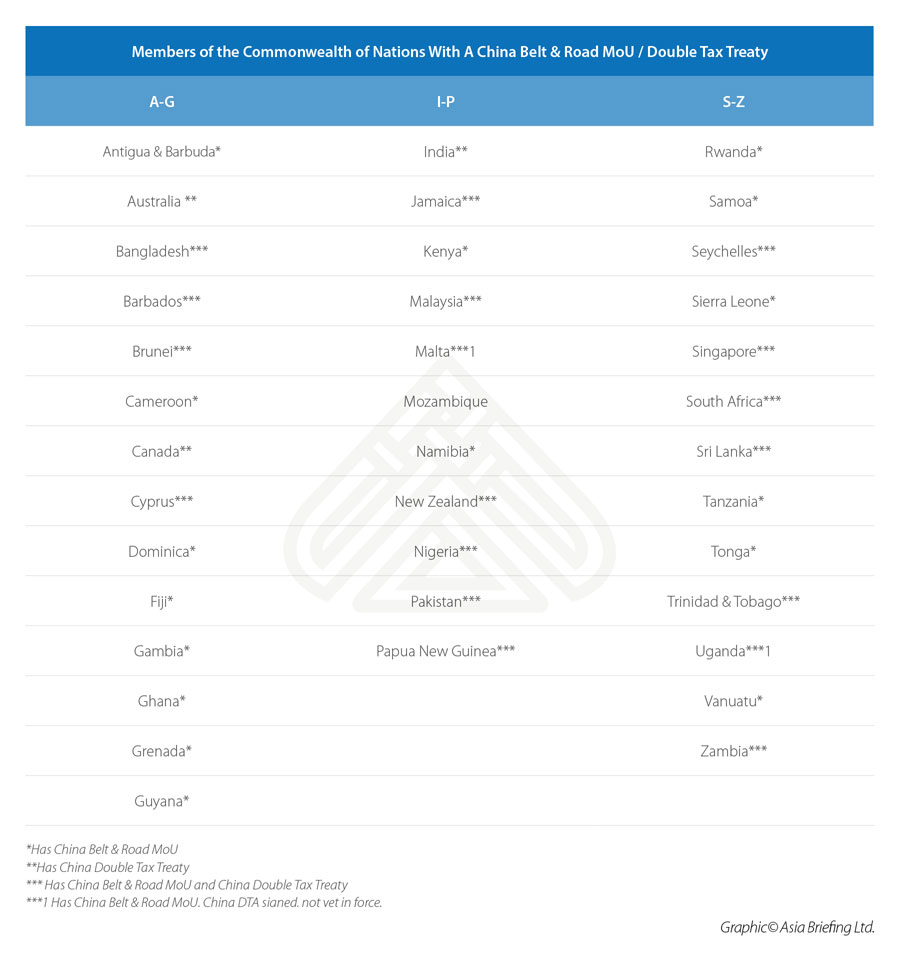What Would Beijing Do If It, Not London, Managed The British Commonwealth?
Op/Ed by Chris Devonshire-Ellis
China Is Taking Over A Long Term British Asset That London Has Been Ignoring
With the new British Prime Boris Johnson in play in the United Kingdom, signs are that London will be playing hardball with the EU over Brexit. He has refused to meet any EU leaders until they agree to various changes to plans already submitted to his Predecessor, Theresa May, who tried three times to get a Brussels endorsed deal through Parliament and failed each time. While such a hardline with the EU may open up some doors to trade negotiations, it seems apparent that the initial course of action for the UK is to seek a trade deal with Washington as an alternative. Trade Minister Elizabeth Truss especially seems keen on this route. However, in doing so, London would essentially swap Brussels for Washington.
While many are keen to establish a trade deal with the United States, it would also be wise to consider alternatives. Washington has a habit of imposing restrictions on trade deals, including the ability to trade with countries such as China. I pointed this out previously in the article Could A Post-Brexit Britain Emerge As A Silk Road Player & Counterbalance To China? In that, I explained how the recent US trade deal with Canada forbade Canada from entering into trade deals with China that did not suit American interests. “Washington could insist (on a trade deal with the UK), as it has done with the new USMCA agreement between the US, Canada, and Mexico, on elements within the deal that effectively limit (Britain) from reaching their own trade deal with Beijing. The issue is a clause inserted into the USMCA agreement that specifies that if any of the partners enters into a free trade deal with a “non-market” country like China, the other USMCA countries can terminate the USMCA with six months’ notice and negotiate their own bilateral agreement.
This clause, Article 32.10 in the USMCA deal, has created controversy in Canada. But it has helped US President Donald Trump isolate China by preventing China from pursuing agreements with Canada or Mexico that serve as a back-door to ship products into the US. Although Ottawa has claimed the clause will not prevent Canada seeking a trade deal with China, opponents of the agreement state that Washington DC wants to control how countries trade with China, a situation Beijing has called “an infringement of sovereignty.” With the UK actively seeking a trade deal with the US as its first priority, much of how a future UK-US trade deal is designed will impact on whether London is prepared to stand up for itself and insist on the UK’s right to negotiate trade agreements with whoever it wishes. A UK-China free trade deal will or will not happen as a result of what can be agreed between London and Washington DC. If it does, then China is likely to be prepared to offer the UK better terms than it would the EU.”
Dezan Shira & Associates 28 Year Relationship With The UK
I am not alone in my scepticism over a UK-US trade deal. The Guardian has commented as well in the article A Trump Trade Deal With Britain Will Unleash A Bonfire Of Regulations
In other words, although the British civil service will be pushing to get a deal done in the absence of any from the EU, it might be wiser for the Johnson cabinet and Trade Minister Elizabeth Truss to take their time over this and look at the alternatives. In the meantime, the UK can trade under WTO regulations.
One of the aspects that has not been mentioned at all in the UK trade options is the British Commonwealth. Yet it is a well-proven, sizable entity with a trade volume of US$14.6 trillion encompassing 53 nations. Known today simply as “The Commonwealth Of Nations” these are the simple facts:
It may surprise many that the Commonwealth of Nations has been outstripping the EU in three determinants: population size, the size of the economy, and economic growth rate. The figures shown above are from material recently published by World Tracker as well as the IMF, World Bank, and United Nations. It includes the following countries and territories:
Africa Botswana, Cameroon, Eswatini, Gambia, Ghana, Kenya, Lesotho, Malawi, Mozambique, Namibia, Nigeria, Rwanda, Seychelles, Sierra Leone, South Africa, Tanzania, Uganda & Zambia
Asia Australia, Bangladesh, Brunei, India, Malaysia, Mauritius, Pakistan, Papua New Guinea, Singapore & Sri Lanka
Caribbean, the Americas Antigua & Barbuda, Bahamas, Barbados, Belize, Canada, Dominica, Grenada, Guyana, Jamaica, St.Kitts & Nevis, St.Lucia, St.Vincent & Grenadines & Trinidad and Tobago
Europe Cyprus, Malta
Pacific Fiji, Kiribati, Nauru, New Zealand, Samoa, Solomon Islands, Tonga, Tuvalu & Vanuatu
The British Commonwealth Is The Original Model For China’s Belt & Road Initiative
In terms of size and stature then the British Commonwealth has rather a lot in common with China’s Belt & Road Initiative. That is why it is pertinent to ask what the Chinese would do with it if they were in control. After all, the Chinese economy has been growing at impressive rates for over two decades now, and at a pace far higher than the UK has managed. As I explained in yesterday’s article The Belt & Road’s Business Secret: Cashflow Opportunities Come After Infrastructure Development the general economic consensus is that the Belt & Road Initiative will assist with development growth and opportunities in the countries in which it impacts. As the Development Bank of Singapore has said: “The Belt & Road Initiative will help to improve infrastructure conditions in South-East Asia, enhance the overall investment environment and attract the general FDI inflows. An improvement in power supply and transportation networks, for instance, will reduce the production and logistics costs. This will, in turn, encourage Chinese (and other foreign) companies to invest and build manufacturing facilities. In addition, the infrastructure projects under BRI will create a value chain for services. This will involve not only project financing, but also engineering consultancy, engineering insurance, infrastructure management, legal, advisory and various other types of professional services. Investment opportunities will also arise in these areas.”
Studying the modus operandi of China with the Belt & Road Initiative as a producer of investment, and the returns and increased trade this implies is of direct pertinence to the British Commonwealth of Nations. How would China develop the Commonwealth if it were in charge of what in the UK remains an unfashionable asset? Having studied Chinese outbound investment in a near 30 year career in China, it is apparent that the following mechanisms and trade incentives would take place were the Commonwealth a Chinese asset:
Evaluate Trade & Investment Potential & And Sign Off Tax Treaties
China has been extremely active through its diplomatic missions overseas and has build up a huge resource of trade, economic and related intelligence to allow it to make decisions as how to best prioritize countries along the Belt & Road Initiative. All are actively encouraged, but some are naturally more developed than others. The same is true of the Commonwealth nations. London also has the intelligence of the trade merits of each of the Commonwealth members. In China were managing the Commonwealth it would put in a concerted effort to determine which members offer the most potential in short, medium and long term economic and trade development. Beijing would then introduce trade structures as follows:
Bilateral Investment Treaties
China has been entering into bilateral investment treaties (BITs) with other countries since the early 1980s, when the nation began its path to reforms under then-Premier Deng Xiaoping. Although many have now been superseded by more complicated and sophisticated trade agreements such as double tax treaties (DTAs) and other bilateral mechanisms, BITs remain important, especially for investors from emerging nations with relatively immature tax laws and regulatory environments. Such treaties also help to underpin the bilateral investment conditions between China and other developed nations.
The purpose of a BIT between two countries is reciprocal encouragement, promotion and protection of investments in each other’s territories by companies based in either country. These treaties typically cover the following areas:
- Scope and definition of investment;
- Admission and establishment;
- National treatment;
- Most-favored-nation treatment;
- Fair and equitable treatment;
- Compensation in the event of expropriation or damage to the investment;
- Guarantees of free transfers of funds; and
- Dispute settlement mechanisms, both state-state and investor-state.
The sheer longevity of a given BIT goes some way to explaining their usefulness, and investors into China from other countries should be aware of the contents of these documents. China has over 80 BIT in place, and continues to use them in its bilateral relationships. For example, while the BIT signed between China and Switzerland was ratified way back in 1987, others still continue to be put into position. The BIT agreement between China and Canada was negotiated at the Vladivostock APEC summit in 2012, and was tabled before the Canadian Parliament a year later.
While BIT agreements as a general rule of thumb may now be purely a matter of academic or historical interest, for some countries these treaties provide a useful mechanism for understanding the legal, tax and dispute resolution mechanisms for investors into the country. As such, BITs are a useful starting point to clarify legal and tax treatments under bilaterally agreed conditions and should be understood as a bilateral document of first resort when understanding the investment environment, and protection mechanisms that China offers its many trading partners. These tend to be of particular importance for understanding the rights of companies investing from or into emerging markets throughout Asia, Africa, Latin America and the Middle East.
China has signed off 145 BIT with other nations, while Hong Kong has an additional 20. Currently the UK has 28 in force amongst the members of the Commonwealth of Nations, suggesting that some catch up needs to be deployed. In order to properly set up a modern trade platform with the existing commonwealth, more trade effort needs to be put in place by the UK as concerns codifying and nurturing Commonwealth nations as concerns bilateral trade potential.
Double Tax Agreements
Double taxation has been dubbed “one of the most visible obstacles to cross border investment,” leaving room for a significant amount of money to be saved under the almost 3,000 double taxation avoidance agreements (DTAs or DTAAs) signed between nations across the globe. To combat such obstacles, DTAs aim to prevent the same income from being taxed by two or more states, while also eliminating tax evasion and encouraging cross-border trade efficiency.
DTAs are mostly of a bilateral nature and, while DTA-signing countries are not all members of the Organization for Economic Cooperation and Development (OECD), DTAs are generally based on model conventions developed by the OECD or (less commonly) the United Nations. And while about 75 percent of the actual words of any given DTA are identical with the words of any other DTA, the applicability and specific provisions of each treaty can vary substantially.
From an investor’s perspective, confusion about international taxation can arise when investors are subject to two different and potentially conflicting tax systems. For example, Hong Kong and Singapore adopt a “territorial source” principle of taxation, which means that only profits sourced locally are taxable. Meanwhile, other countries such as China and the United States are on the worldwide tax system, and resident enterprises can be required to pay tax on income sourced both inside and outside of the country. DTAs not only provide certainty to investors regarding their potential tax liabilities, but also act as a tool to create tax-efficient international investments. With Italy recently signing up to China’s Belt & Road Initiative, a China-Italy Double Tax Treaty has also been agreed and updated to enhance the bilateral trade, being signed off in March this year.
China has signed of DTA with 85 countries along its Belt & Road Initiative as follows:
The UK has currently signed off 31 DTA with countries belonging to the Commonwealth of Nations as follows:
Free Trade Agreements
China has developed a strategic position when it comes to entering into free trade agreements – the policy of allowing dutiable and tax reduction on certain products and services being one of the main cornerstones that has projected the nation to be the world’s manufacturing hub over more recent years. Without doubt, the signing of the China-ASEAN FTA in particular will continue to have a huge impact on China and Asia’s development in global sourcing and the foreign investment related to this.
China also has a Free Trade Agreement with Switzerland, which as a result has become one of the few European nations not to have a China trade surplus. In total, China has signed off FTA impacting upon 25 countries (including the ten ASEAN nations) with another 12 under negotiation. The UK currently has no FTA with any of the Commonwealth of Nations countries with the exception of Canada. While this is indicative of the UK membership of the EU, which signs off agreements strictly on a multilateral basis, it also means that British trade has been hampered by this as the UK has not been able to negotiate FTA without EU approval.
China’s Trade Take Over Of The Commonwealth Nations
This lack of effort by London in engaging with the Commonwealth of Nations has had more than an impact of the organization slowing slipping into the sunset along with dusty British colonial history. Beijing has spotted this and has actively engaged with Commonwealth of Nations members in terms of offering them Belt & Road MoU, which often come with infrastructure developments and other investments, as well as trade benefits such as Double Tax Treaties. In doing nothing, London has effectively allowed Beijing to take over the trade benefits of having the Commonwealth in the first place, and relegated the UK’s to pay for an occasional state dinner at Buckingham Palace. The effect of London ignoring the Commonwealth’s trade potential has been to hand it to the Chinese. This is a list of Commonwealth Nations who now have a Belt & Road MoU and/or a Double Tax Agreement with China.
Clearly there has been a huge amount of British trade neglect when it comes to putting into place trade agreements with the Commonwealth. It is debatable whether London even understands the trade and development potential in the same way that the Chinese do. Meanwhile, it is gradually being frittered away to the benefit of Beijing. The real question to be asking is why, when the UK is on the verge of leaving the EU without a deal, has nothing been done to re-invigorate trade within a body that has been well established for over 60 years?
The comparison with how China would utilize the Commonwealth of Nations if Beijing were in control is apt. With the UK seemingly about to crash out of the EU with no deal, there is a small window for it to stay calm and properly evaluate the assets it still has. There is a period where the UK could trade without agreements with either the EU and the United States and simply exist under WTO rules until all options are fully explored. Spending time reevaluating the Commonwealth of Nations is not an opportunity that Beijing would turn down, and neither should London. Striking an immediate deal with Washington would not be good negotiating tactics. It would be far better, having gone this far down the road with Brexit, to take a more considered approach and look at alternatives and keep others waiting until London can get its own house in order and properly evaluate where it is and what assets it has before agreeing any deals. This is now more true than ever given that a number of influential American Senators have said they will block a proposed US-UK trade deal if the UK interferes with the Irish backstop, which the British PM Johnson has said must be removed. Right now, London is between a rock and a hard place, yet has ignored the one trade asset it really could control and benefit from – the Commonwealth of Nations. That should have been positioned as a trade bloc to provide a soft landing, yet has instead been repeatedly diminished.In fact this work should have been undertaken as an immediate exercise in options once the Brexit clock began ticking three years ago. Recognising this, even belatedly, and applying some British initiative and trade development expertise and Belt & Road style trade agreements to the member countries of the Commonwealth of Nations, and showing them collectively and individually some common sense trade attention would be a good start.
About Us
Chris Devonshire-Ellis is the Chairman of Dezan Shira & Associates. The firm assists British and Foreign Investment into Asia and has 28 offices throughout China, India, the ASEAN nations and Russia. For strategic and business intelligence concerning China’s Belt & Road Initiative please email silkroad@dezshira.com or visit us at www.dezshira.com










